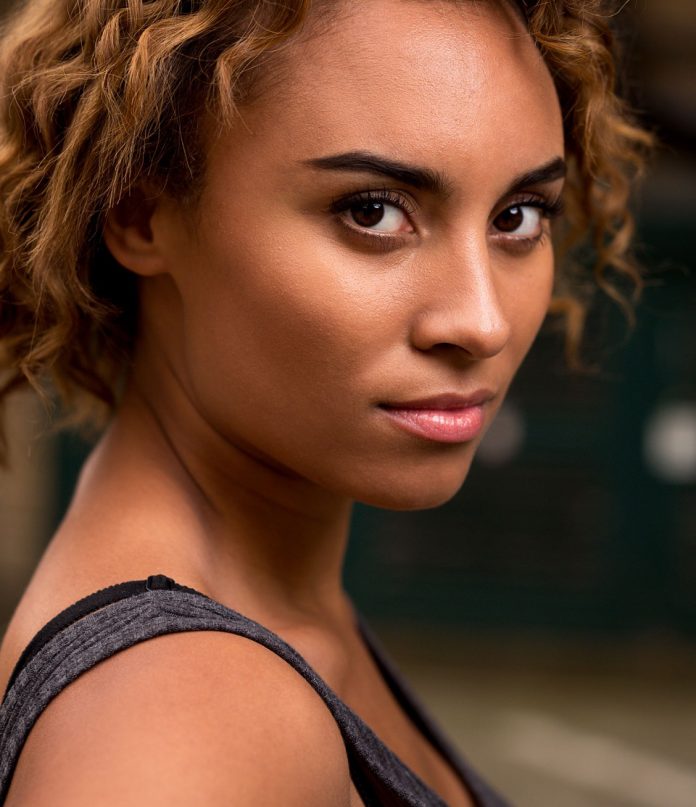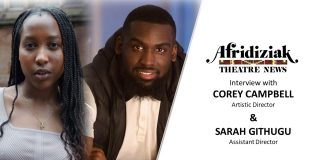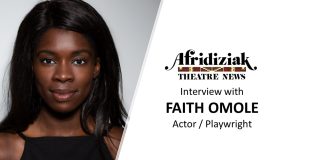How are rehearsals going for End of the Pier?
They’re going well. The rehearsal room feels like a very safe and open space and there is a high level of concentration. Also, the boys are all hilarious so that helps.
How do you find the dynamic of being the only female in this production?
I must admit my heart sinks a little bit every time I read a script with predominantly less women in than men. We really need a larger and better representation of women on stage and screen. Having said that, sometimes the story doesn’t allow for it. This play has the right amount of people of the right gender. Danny Robins writing is poignant and engaging and asks a lot of difficult questions. So we’ll let him off the hook for this one. It explores the father and son dynamic, the role that violence plays among men, race, class, and change. We also have a very talented director and an incredibly diligent company stage manager who also happen to be women. So between me, Hannah Price and Jess Gow we have a strong female presence in the room.
Tell us a bit more about your character?
Jenna is, what you would call, a successful woman. She is a commissioner at the BBC, a homeowner and is about to marry the man she loves. A woman who seemingly ‘has it all.’ She goes to Blackpool to see her fiancé do a stand up gig and is suddenly confronted with a world unlike her own. Where racism is closer to the surface and even worse, there is no Pret a Manger. What I love about her is that she is direct and unapologetic about who she is. She is dry, sarcastic, a little rude and a joy to play.
We really need a larger and better representation of women on stage and screen
Why should people come and see End of the Pier?
Because Les Dennis is in it! Also because it feels relevant and important. There is a real feel of unrest in the UK (and America) at the moment. I think people are angry and scared and looking for someone to blame. End of the Pier takes a look at this anger and this fear and it brings it to light. It makes people look. It may not make you feel comfortable the entire evening but it will make you think and feel and laugh. Well that’s the plan anyway.
What tips would you give to a person of colour, who wants to become an actor?
Claim your space. People will tell you that you only got the job because you were ticking a diversity box. Don’t listen to them. If you are in a period piece people will tell you that there were no black people back then. Don’t listen to them. (Minorities were not invented in the 1980s.) People will also tell you that you are very lucky at the moment, that the industry only wants ethnicity. Don’t listen to them. You’ll be rather disappointed when 70 scripts with well-rounded characters don’t land into your inbox. Find an agent that sees you as much more than their BAME actor. Someone that will fight for you, and put you up for roles that are not specifically for actors of a different ethnicity. If you have the luxury to choose roles try not to play stereotypes. Be good. Be interesting. Be passionate and tell stories. Don’t be afraid to take your seat at the table. Claim your space.
You’ve had a varied career across TV, film and theatre –tell us about an acting experience that you felt pushed your limits and challenged you into growing.
I like jobs that are a challenge. The ones that make you scream “Why am I an actor? I should have been an accountant!” In the middle of a job. And “Ah, that’s why I do it.” At the end. I was recently filming in Berlin, in German. And before you ask, no, I do not speak German. That was one of the harder challenges. Not just the learning of the lines but also how to pitch it, finding the rhythm, the inflections, which words to emphasise. Learning a different style and rhythm completely different to my own. I had to rely on the people around me to tell me what worked and what didn’t. I couldn’t fall back on my own judgment so I had to let go and trust the people supporting me. Which was a challenge in itself. I think doing something in another language is a great learning experience for an actor and I hope to do it again.
What are some of your earliest memories from when you started out as an actor and how has the industry changed over the years?
One of my first telly jobs was in a sketch comedy show called Fit. It was directed by Dominic Brigstocke who had directed some of my absolute favourite shows – Green Wing and Smack the Pony. So working with him felt a little unreal. But he taught me to trust my instincts and told me (never laughing) that I was “very funny.” He also taught me to find my light and to please not block other actors with my head – all invaluable things to give me the confidence and craft that I needed. It’s hard to see what has changed in the industry as when you are in it everything seems to move rather slowly. But I think the parts for women and BAME actors are gradually becoming more interesting, more human and more fun to play. When I first came out of drama school I constantly went up for the same kind of roles. The characters were very ‘street,’ (as it is often named in the brief.) I felt that the parts for young black women were always ‘working class’ roles. This is something that should be represented, but it felt like this was almost the only representation. And I feared that if a certain group of people are represented too much in the same way then that representation starts to feel like the only truth. Interestingly, Jenna is the most middle class and well-educated character in End of the Pier and I think this adds a whole new layer and dynamic to the piece.
How do you mentally prepare for going on stage?
It really depends on the play actually. What energy I need, who I’m playing, who I’m sharing a dressing room with. But I normally get into a rhythm and do the same thing each night. Actors really are rather superstitious about these things. For example, when I did the Mountaintop at the New Vic theatre I had my own dressing room. Daniel Francis who was playing Martin Luther King would come into my room and we would each pick an Angel card. The cards had different words on them and whatever we picked would be what we would use to play that night.
Don’t be afraid to take your seat at the table. Claim your space.
So we would pick ‘Authenticity’ or ‘Simplicity’ or ‘Risk’ and have something slightly different to work on in the scenes that night. I would then practice my long beat poem monologue whilst I did my make up. Then I would put on Walking in Memphis and dance and sing around my dressing room (this is why it depends if you have your own dressing room or not.) I would stuff popcorn into my bra in case I got hungry on stage (and because it was a prop.) And would time putting on my red lipstick to the end of the song. The final touch. Then I would absolutely drench myself in water so it looked like I was coming in from the rain and off I went.
This year Afridiziak Theatre News celebrates its 10th anniversary, what are some of your theatre highlights from the last 10 years; standout productions/performances etc?
I thought People, Place and Things was a fantastic piece, and well deserved the attention it got. Those of us who saw Mark Rylance’s performance in Jerusalem will surely never forget it. That man is a genius. The most recent thing I saw that grabbed at my heart was Hannah Gadsby’s ‘Nanette.’ A stand-up comedy show that I saw at Soho theatre. Hannah is wonderfully dry and deadpan and effortlessly funny. But then the piece goes somewhere else. Somewhere dark and honest and heart wrenching. One minute I was crying with laughter and the next I was sobbing real tears into my glass of red. What started as stand up became true, truthful storytelling. Beautiful, brutal and honest. One of the things that comes up in our play is the question of what is a great comedian and there is a feeling that real honesty is what releases the best laughs. Hannah Gadsby has that real truth and it is so refreshing, wise and satisfying. She has a Netflix special now you guys, seriously, watch it.
What’s next for you after End of the Pier?
Great scripts, great characters, and great stories. I hope.


























